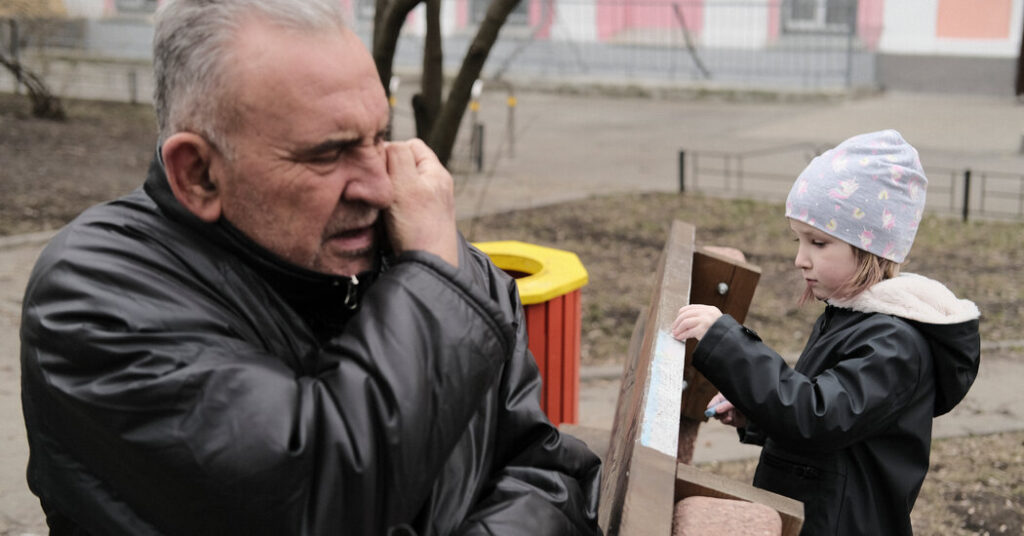WAR DIARY, by Yevgenia Belorusets
Robert Stone called the Vietnam War “a mistake 10,000 miles long.” In Ukraine, the front lines of the unwanted war with Russia extend about 600 miles. Surely that distance seems vastly longer to Russian troops stymied there. It must also seem longer to Ukraine’s citizens, for whom the war is immoral, illegal, stupid, concussive and terrifying.
When Vladimir Putin’s “special military operation” against Ukraine began a little more than a year ago, on Feb. 24, 2022, the artist and writer Yevgenia Belorusets began keeping a public diary. It ran in the German newspaper Der Spiegel and was released each day online by the avant-garde publisher Isolarii in connection with Artforum. Her diaries were adapted for an episode of the weekly public radio show “This American Life.”
All this sets one up, perhaps, to expect more than this modest wafer of a book can deliver. But “War Diary” is among the first books to come out of this conflict, and it has plenty to say to a world audience.
The entries capture the first few weeks. Belorusets was in Kyiv, her hometown, at a distance from most of the fighting. Her elderly parents lived a five-minute walk away. The terror mostly came in over news broadcasts, and the messaging app Telegram. There were rumbles in the distance.
Americans who lived through the Great Depression tended to describe a hollowing out of cities, a clearing of roads. That’s what happens in wartime too. “When I left my apartment today, I saw an empty street,” Belorusets writes. “No cars, no pedestrians. At such moments Kyiv seems like a city that has yet to be inhabited — a city without a present, with only a past and a future.”
Belorusets carries a camera, which makes her suspect to both sides. Armed men leap out of cars and ambush her; citizens report her, fearing she is spying for Russia. She is dragged to checkpoints. A friend tells her, “A sniper can catch the glint from your lens and aim to shoot.”
She’s careful about what she photographs. No resistance activities. No weaponry. A TikTok video apparently revealed the location of Ukrainian tanks, and the result was a fearsome shelling.
The big emotional takeaway from “War Diary” is a sense of abandonment. Belorusets can’t believe that the world is watching these atrocities, right out on Ukraine’s streets, and not stepping in more forcefully. Russia’s troops, to her, seem more like terrorists than soldiers.
Humanizing details pile up. She notices that one Ukrainian soldier is a former barista, known for the swans he would paint in milk foam. She quotes a message from her electric company urging residents to pay up: “Many Kyiv utility workers joined the Ukrainian army and are now fighting for our freedom. But it is still important to settle the bill.” She talks about the psychological importance of cleaning your apartment, even if you live mostly in the dark, with taped windows. An air-raid siren sounds to her like elephant language. She writes a good deal about pets that are left behind.
Belorusets also captures the mannerly, unflappable side of Kyiv. She writes about its wide avenues, its museums and botanical gardens and sculpture parks, its old houses and stately rivers and private zoos. She offers glimpses of the city’s intellectual life. Her father is a translator of German poetry into Russian. Nearly everyone she knows is an artist of some sort.
This book’s self-consciousness, as an art project, saps some of its immediacy. Belorusets’s prose, in this translation by Greg Nissan, lacks depth and grain. (She divides her time between Kyiv and Berlin, and this translation is from the German.) We don’t feel we come to know her very well. Few if any of her photographs, printed here in black and white, capture what Cartier-Bresson called decisive moments. For a book where tears are somewhat scarce, the author is poorly served by the neo-Gothic typeface on the cover, which makes the title appear to say “Waa Diary.”
It’s interesting to witness the way Belorusets thinks about the enemy. She despises what’s happening to her country, and she deplores some Russian soldiers who are drunks and louts. But she’s aware that so many of them have been lied to about what they’re doing in Ukraine. She considers compassion and its limits.
While the author remains in Kyiv, the news from nearby is an awful drumbeat. She notes the reports of mass graves, ordnance dropped on apartment buildings, murders of fleeing families, corpses seen by the side of the road. It all seems to be happening in a dream.
She relates her best hopes and worst fears. One of the few upsides to the terror is that it gives the city’s residents a shared purpose; it yokes them together. Often it’s all too much. As she waits and worries, you sense her heart just idling out there, like a car parked in an underpass during a storm.
WAR DIARY | By Yevgenia Belorusets | Translated from the German by Greg Nissan | 137 pp. | New Directions | $16.95

